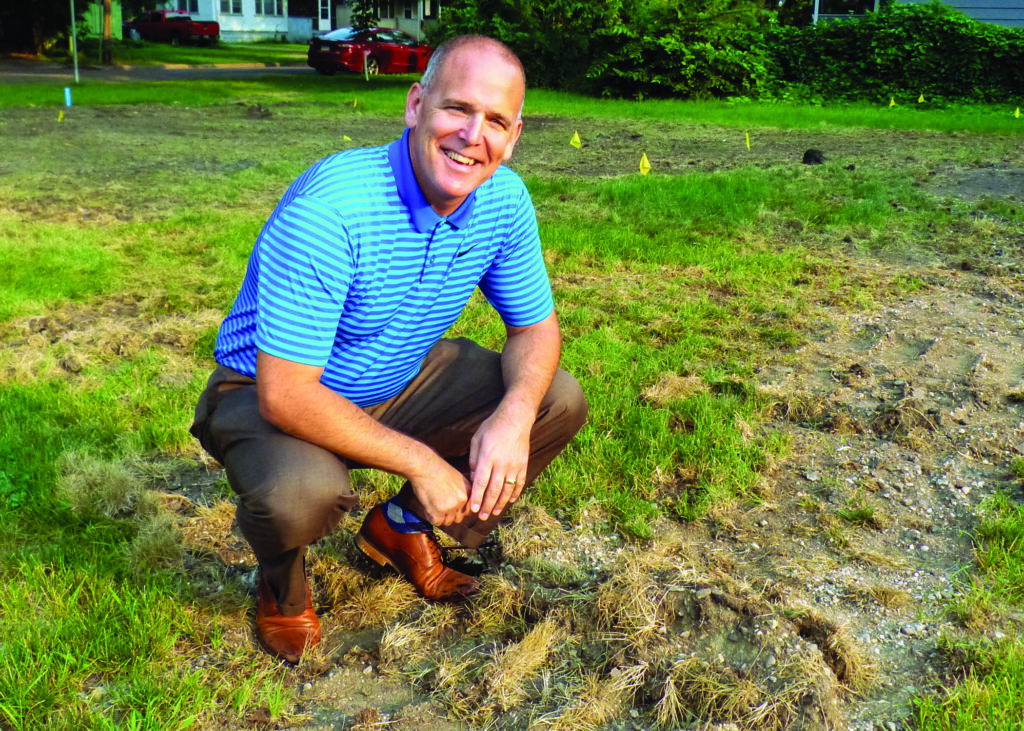
Executive director Trenton Gerads of the Cass Clay Community Land Trust predicts empty lots like this — the group’s first venture — will spur development of 105 new affordable homes over the next four years. (Photo/Nancy Hanson)
Nancy Edmonds Hanson
The Fargo-Moorhead area needs skilled workers. Despite the rise in historically low unemployment figures due to COVID, the community’s historic need to recruit willing workers continues. But so does a persistent problem: Wages have not risen at the same pace as home values, and unaffordable housing makes recruitment a challenge.
That was the conclusion of a workforce study conducted by the F-M Regional Workfoce Partnership five years ago. The skilled workers needed to grow the economy generally earn between $15 and $30 an hour – not enough to qualify for a median-priced home here, which website Zillow calculated was $194,800 in Moorhead, $223,500 in Fargo, and $229,500 in West Fargo is $229,500 in 2019.
That’s why the Cass Clay Community Land Trust was created. Given birth by the F-M Area Foundation, the idea has taken shape as an independent nonprofit entity determined to help make freestanding homes affordable for the average family, who – according to other statistics – has a median income of $89,400, according to the U.S. Department of Housing and Urban Development.
“That may sound fairly generous, but remember – it’s a gross number,” points out Trenton Gerads, the Moorhead man who runs the organization. “Mortgage payments on that median home, along with taxes, specials and other costs, are going to run around $1,500 a month. Add that to other living costs and expenses like a car loan or maybe two, credit cards, student loans, daycare, and that housing cost gets out of reach even before the down payment. The people we’re trying to bring to town don’t want to live in apartments all their lives. Getting into a house is a big part of whether or not they can be recruited.”
One solution recommended by the study was creation of the land trust, which reduces the cost of a house by retaining ownership of the land on which it is built. The concept isn’t new; it has flourished in other communities facing the same squeeze, including Duluth, Grand Forks and Minot. Unlike some other housing programs, this one doesn’t focus on getting the homeless into homes. Rather, its audience is those who are employed but still priced out of the market.
The CLT – Community Land Trust – will continue to own the land beneath the houses its partners build and sell to families. Those who occupy them will make modest monthly payments to the trust on 99-year leases. But in the meantime, they will also benefit from all the perks of home ownership. When they finally sell their houses, the appreciated value will be split between them and the trust. While they may use the proceeds to move up, the trust will plow its portion back into more housing, while issuing another 99-year lease to the new homeowners.
It’s a complex model, but one with easy-to-understand benefits. Without having to include the land, home sale prices can be kept within the budgets of average-income families. The CLT board, Gerads says, projects completing more than 100 housing units between now and 2024, including 10 this year, 15 in 2021, and 25 in each of the next three years.
Hired to run the land trust in May, Trenton has tackled the challenge from all sides – securing land with grants and donations, recruiting developers to build on those lots, identifying bankers willing to offer land-lease mortgages, and finally recruiting the families who will ultimately own those homes. The first, a pair of twinhomes, is going into the ground on a lot on 13th Avenue South in Fargo, with Rebuilding Together – the local home repair and renovation service – building from the ground up. A selection committee will decide which candidate who applies for consideration bests suit each house as it becomes available.
As Gerads describes it, the partners who develop the homes complete them, then donate the lot itself to the trust. While Rebuilding Together is a nonprofit, partners aren’t limited to the charitable community. “We’re looking for anyone who’s interested in building affordable housing,” he says. That includes commercial builders and the cities themselves. Because CLT is a 501(c)3 corporation, substantial tax benefits accrue when the land is donated.
The land trust principle builds more than houses; it’s seen as a way to build community. “Home ownership isn’t only a benefit to the families themselves,” he points out. “When they purchase their own homes, they put down roots in a neighborhood. Their children are more likely to keep going to the same schools. They’re likely to be more engaged in the community. They become more civic-minded. They help build stronger neighborhoods.”
He says that in his first three months at the CLT’s helm, he has found considerable interest, from the financial community and large employers. “They know we don’t have enough of the right kind of housing,” he points out. A handful of local banks have already stepped up to consider the lease-hold mortgages required under the arrangement.
The uncertainty surrounding COVID-19 has slowed support somewhat, he concedes, with charitable efforts directed more toward supporting those unemployed and otherwise affected by the pandemic. “For us, being the new kid, that’s been a struggle,” he observes. “But at the same time, the housing market hasn’t really slowed down too much. Just two weeks ago, the average price of houses on the market in Cass and Clay Counties was $310,000.”
For more information on the Cass Clay Community Land Trust, including donations and partnerships as well as information on applying to be considered for homes, go to areafoundation.org/initiatives/ccclt/.


